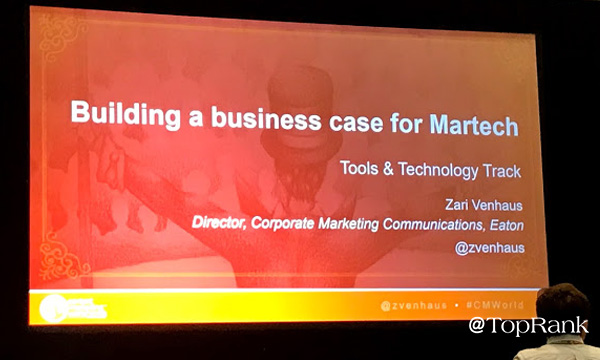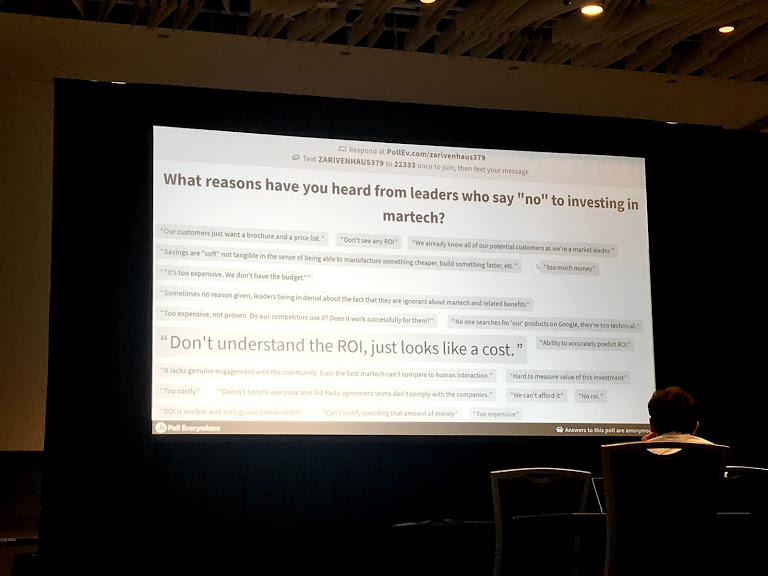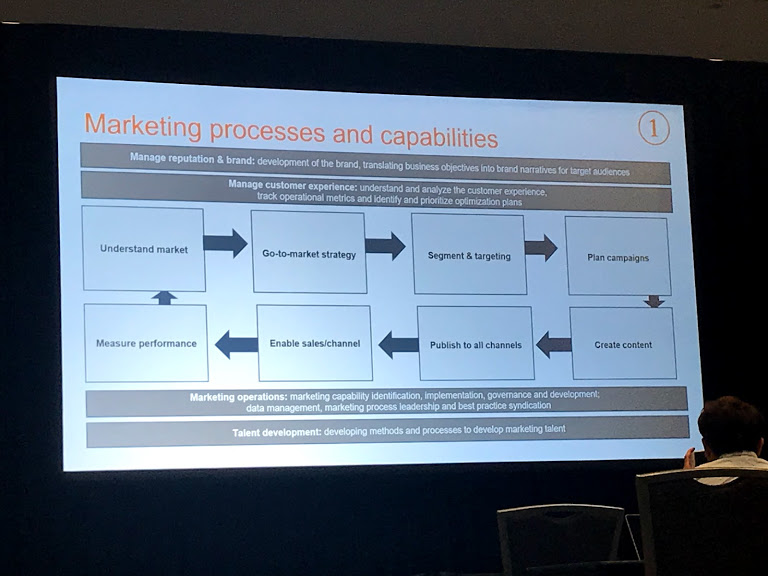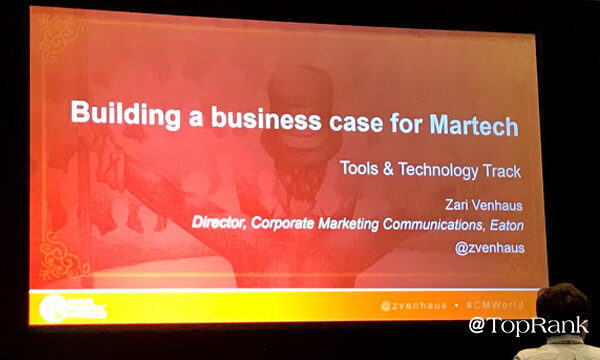
I had the pleasure of sitting in on Zari Venhaus’s session at the second day of Content Marketing World 2019 where she laid forward a process to present martech business cases to senior leadership. She entered the room with a high level of energy and passion for the topic, making her an engaging speaker from the second she took the stage.
After a quick bit about the company she works for, Eaton, which is a $22 billion power management company, she dove into a marketing technology business case she undertook as their Director of Corporate Marketing Communications.
She insists she was not successful her first time creating a martech business case. It took living through many failures and successes to reach the process she uses today. Now, she feels ready to share those lessons with an audience like us so we do not have to suffer through the same trial and error.
Getting Started
Throughout her presentation, Zari peppered in powerful quotes and statistics, starting off with a strong stat that illustrated the marketing technology landscape of today:
“29% of marketing budgets are spent on Martech” – Gartner CMO Spend survey 2018-2019
After letting that statistic sit with the room, she conveys yet another statistic, showing that not far behind marketing technology spend, is that of labor. Zari implores those in the room to consider how the two work together as we begin our own journey of building a business case, seeing as the best business cases often address both.
Then, she takes a step back, encouraging us to ask ourselves three questions before we begin building our cases, noting that all great strategies start with insightful questions.
- How can I demonstrate to senior leaders, who are often removed from the day to day activities in which marketers are enveloped, how integral technology is to our job performance?
- What are the objections they are likely going to need to have addressed as we present our case?
- How can I tell a story that is not only educational but also compelling, to bring them to a place where they are comfortable and confident signing on the dotted line.
Once these questions have been mulled over by key people involved in building the case, it’s time to apply the answers. Here’s how to do it.
Setting the Stage
Start by painting a picture of how marketing teams use technology. Use that picture to ensure your senior leaders understand the significance technology has on the efficiency and effectiveness of your team.
Then, put it in language that resonates with them. Whether it’s drawing on quotes from industry thought leaders or using tried and true marketing vocabulary, use language that is going to help you get the point across that, “marketing without technology is not marketing at all”.
Once that point is conveyed, prepare for potential objections. Common ones include:
- “The cost is too high.”
- “I don’t understand the value.”
- “ I don’t see the ROI.”
- “It’s too hard to measure.”
- “We can’t afford it.”
Know the audience and document answers for a wide range of questions that incorporate their respective areas of interest.
“34% of CMO’s said that their company’s resistance to embracing and investing in innovation and digital is the number one thing that keeps them up at night.” – Korn Ferry, CMO Pulse survey 2017

It’s our job, as marketers, to get to the roots of that resistance. If you can understand the cause, you’re going to be able to better address the objection. Often, Zari has found, the root of that hesitance is a lack of technology knowledge that makes the decision-making process overwhelming for senior execs (we’ve all seen the graph of the marketing technology landscape…). It’s up to us to simplify it for them.
Ensuring your business case explains, in a very thorough and detailed manner, how and by who the technology is going to be leveraged is of the utmost importance. If senior leaders understand how a core, competent team is going to be using the technology to achieve particular goals within the larger marketing strategy, you’ve given them a tangible reason to support your case.
Crafting Your Story
After the stage has been set and the importance of technology has been conveyed, it’s time to begin crafting your martech story. Here’s how Zari recommends you do it:
1. Map your marketing process
Create a process flow showing the steps it takes for your team to complete a particular task, pre-technology implementations. Illustrate the complexities. Emphasize the time on task. Point out potential data pitfalls. At the end of the day, this is the process you are recommending needs fixing, so show why it needs fixing.

2. Identify the opportunity
Once the process flow has been built, identify the gap within it to open up the stage for your recommendation. Draw out a comparison of what that process will look like post tech implementation. Articulate the reduction of steps needed to complete the task. Equate the number of hours saved throughout the process. Show the decreased complexity in the workflow.
This is your chance to demonstrate how the implementation of this new technology will increase the efficiency of your processes. Use it wisely to tell your story of opportunity.
3. Intro the technology platform
Now, it’s time to show what your technology can do. This is when you grab from other companies with similar challenges, to show how the technology helped them achieve their goals. Use proof points and specific data to demonstrate to senior executives at your company the power of the tool. Then, to take it to the next level, show how that same story could be applied to your own challenges.
4. Quantify the value with financials
Lastly, it’s time to gather financial data. Although this may be some marketers’ least favorite step in the process, it is certainly the most important. Zari stressed two points as she explained how to go about this.
- Identify and stick to what you can actually measure. This often comes down to the efficiency of your team and the effectiveness of the tool.
- Always be conservative with your predictions. Now is not the time over-promise. Be realistic with your forecasts so that leadership does not have hesitations for renewal down the line.
Close the Martech Business Case
A business case built with the steps Zari laid out can help incite confidence in the creator. It ensures marketers are doing their due diligence to prepare for potential obstacles, paint a picture of success and ultimately, show the cost-benefit to your organization, which is of utmost importance to your senior exec team.
Need more Content Marketing World in your life? Stay tuned to the TopRank Marketing Blog for more tips, tricks, and live coverage. And follow our team: @leeodden, @NiteWrites, @azeckman, and @toprank on Twitter for real-time insights.



